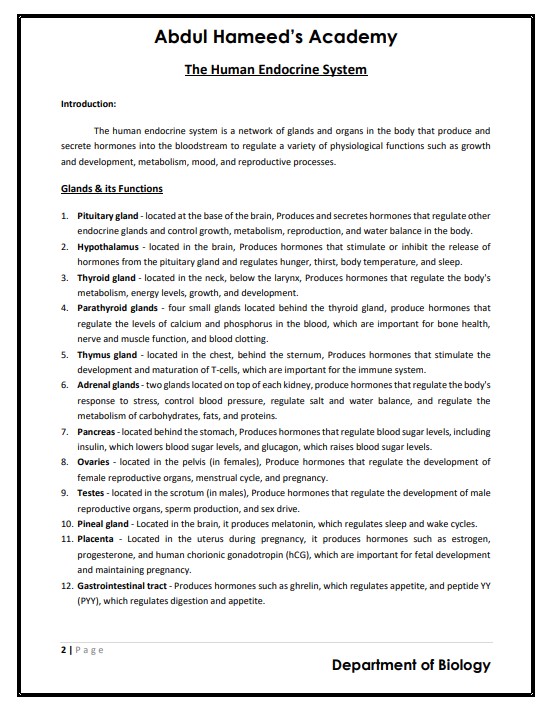Human Endocrine System
Summary:
Gain a comprehensive understanding of the human endocrine system with this comprehensive note. The note offers a detailed introduction to the human endocrine system, covering the location and function of every gland in the body. From the pituitary gland in the brain to the thyroid gland in the neck, we examine each gland and its crucial role in regulating hormones and bodily functions. Additionally, we delve into common disorders associated with each gland, providing valuable insight into the symptoms and potential treatments of conditions such as diabetes, thyroid disease, and adrenal insufficiency. Whether you are a student of anatomy and physiology or simply curious about the human body, our guide to the human endocrine system is an essential resource.
Excerpt:
The Human Endocrine System
Introduction:
The human endocrine system is a network of glands and organs in the body that produce and
secrete hormones into the bloodstream to regulate a variety of physiological functions such as growth
and development, metabolism, mood, and reproductive processes.
Glands & Their Functions:
1. Pituitary gland – located at the base of the brain, Produces and secretes hormones that regulate other
endocrine glands and control growth, metabolism, reproduction, and water balance in the body.
2. Hypothalamus – located in the brain, Produces hormones that stimulate or inhibit the release of
hormones from the pituitary gland and regulates hunger, thirst, body temperature, and sleep.
3. Thyroid gland – located in the neck, below the larynx, Produces hormones that regulate the body’s
metabolism, energy levels, growth, and development.
4. Parathyroid glands – four small glands located behind the thyroid gland, produce hormones that
regulate the levels of calcium and phosphorus in the blood, which are important for bone health,
nerve and muscle function, and blood clotting.
5. Thymus gland – located in the chest, behind the sternum, Produces hormones that stimulate the
development and maturation of T-cells, which are important for the immune system.
6. Adrenal glands- two glands located on top of each kidney, that produce hormones that regulate the body’s
response to stress, control blood pressure, regulate salt and water balance, and regulate the
metabolism of carbohydrates, fats, and proteins.


Reviews